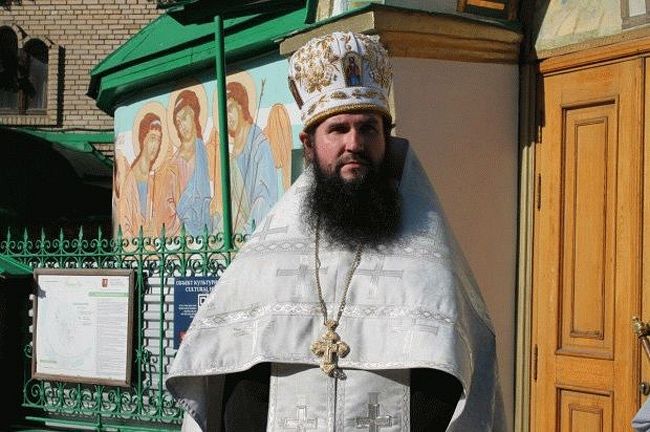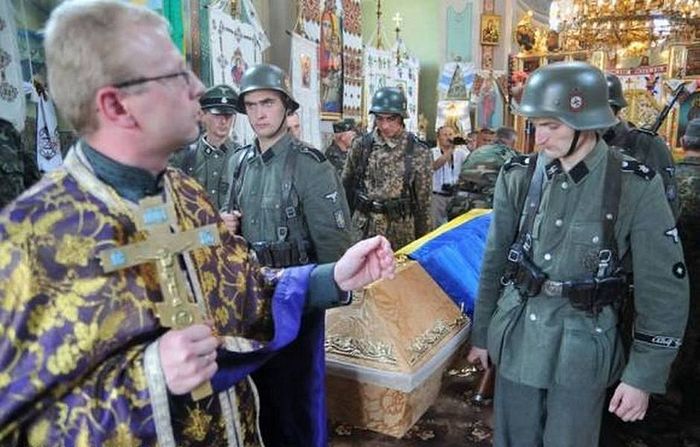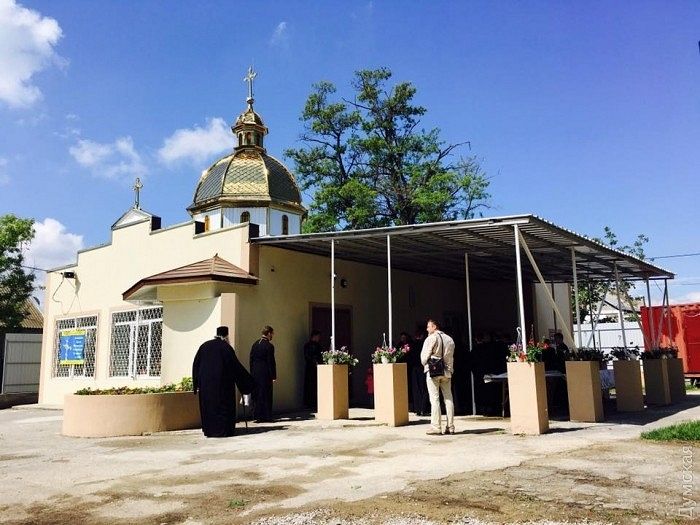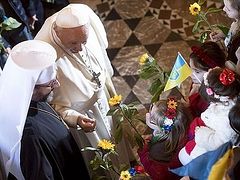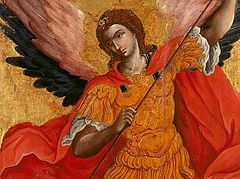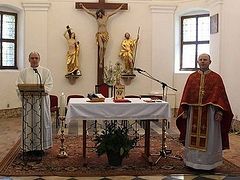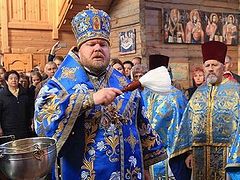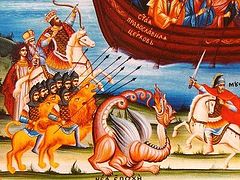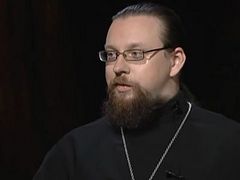This article was posted in Russian by Interfax-Religion back in 2010. We are posting a translation of this interview now as one example of the Ukrainian Greek Catholic church’s (Uniate’s) methods currently being implemented in eastern and southern Ukraine. These regions have always been staunchly Orthodox, and in fact, until the 1990’s there was never a Uniate presence in them. Uniatism was historically centered in Western Ukraine, with its archdiocese in Lvov. During the time of the Brest Unia, what is now Southern and Eastern Ukraine was not even under the same political power as what is now Western Ukraine. Odessa in particular was part of the territory annexed to the Russian Empire by Catherine the Great. Therefore, any claim by the Uniates to this region are absolutely not historical, and can only be described as an invasion into historically Orthodox regions.
* * *
The protests of the Orthodox residents of Odessa against the plans for building a Uniate Cathedral in that city, were accompanied by an active [opposing] PR campaign of the Uniates [Greek Catholics]. The Secretary of the Odessa Diocese of the Ukrainian Orthodox Church, and member of the synodical Biblical-Theological commission of the Moscow Patriarchate – Archpriest Andrei Novikov – talked with Interfax-Religion about how justifiable is the Uniate church's desire to have a cathedral in Odessa, and what is behind their attempt to build it.
—Father Andrei, what triggered the protest of the Odessa diocese against the construction of a cathedral of the Ukrainian Greek catholic Church in Odessa? 1
—When the question was raised at a session of the Odessa City Council about the allocation of land for the construction of a Uniate Cathedral, this provoked strong protest from many Orthodox members of the city council.2 The deputies could not understand the need for building a Uniate cathedral, considering that there are practically no representatives of that religious organization in Odessa; more than 90% of the citizens of Odessa belong to the canonical Ukrainian Orthodox Church. The answer for all of this is clear – proselytism. A resolution was adopted to postpone this issue, awaiting review in communal hearings.
The question immediately received a wide response. Once by one, [government] deputies, representatives of the Orthodox intelligentsia, the public at large, and ordinary Odessites turned to His Eminence, Metropolitan Agafangel personally, in the Odessa Diocesan administration, expressing their indignation at the fact, that in the historical center of Odessa, a Cathedral could be built by the very same “religious confession” which stained its history by cooperating [in WW2] with the occupying Nazi regime, by “blessing” members of the Nazi-Waffin SS, and militants of the so-called “Ukrainian Insurgent Army”, infamously known by the people as “Banderists”.3
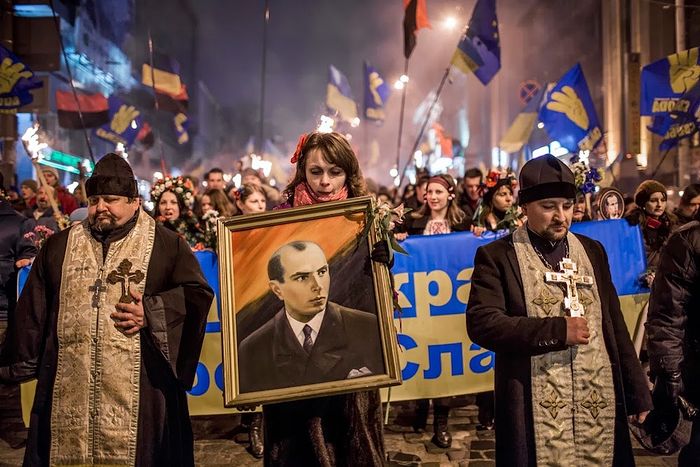 Uniates marching with Nazi war criminal portrait of Bandera
Uniates marching with Nazi war criminal portrait of Bandera
They also noted the fact that Greek Catholic Uniates were among the leaders of those paramilitary groups that organized the pogroms against Polish people and Jews4, and carried out terror against Orthodox clergy.5
Among all who came to us, there was one question: Will the Odessa Diocese determine its attitude towards the fact of the possible construction of a Uniate Cathedral in Odessa; will the Church raise her voice in the defense of the position of Orthodox Odessites?
Therefore, the statement of the press service of the Odessa diocese was in many ways a reaction to the needs of the flock, even though, naturally, both Vladica Agafangel himself and the clergy of the diocese fully share the anxiety of the Orthodox community in relation to the plans of the Uniates in Odessa.
—You mentioned words such as “proselytism” and “expansion”. What in this situation, is being expressed, in your opinion?
—As I already said, it is quite obvious there is no need for the construction of a Uniate church in Odessa. Odessa is an Orthodox city. Yes, representatives of various confessions and religions peacefully coexist within it, having their own historical religious buildings in the city—which, by the way, we never objected to restoring.
—But here we have a completely different case. Seeing as there is no noticeable presence of Greek Catholics (Uniates) in Odessa, from whom do the Uniate preachers intended to form their flock? It’s obvious—at the expense of the Orthodox residents of Odessa, whom they will try to catch with the help of various cunning tricks and bind into the Unia6.
—We know well the history of the Unia, and we know that the Uniates did not reject any methods in their fight against the Orthodox Church. After all, what is this “Union”, if not the missionary project of the Vatican, a project whose very principle is based on the idea of promoting of Catholicism to the East, under the guise of “orthodox” orders and rituals. The purpose for which the Greek Catholic Church was created in its day was the liquidation of the Orthodox Church, and its transformation into an eastern branch of Roman Catholicism. Without these ideas, the very existence of the Unia becomes meaningless.
—When the Uniates transferred their capital from Lvov to Kiev, it was not without reason that the hierarchy of the Russian Orthodox Church, the clergy and Orthodox people so strongly protested against this, and warned against the subsequent expansion of the Greek Catholics to the eastern regions of Ukraine. And here we see the realization of those just concerns.
—You speak of the absence of the Greek Catholic [Uniate] congregation in Odessa, but at the same time, the official statement of the synod of the Ukrainian Greek Catholic Church mentions that ten thousand Greek Catholics live in Odessa…
—And why not fifty thousand, or one hundred thousand, why not go for really massive numbers? But seriously, all of this “data” about the high number of Uniates in Odessa is taken literally out of the sky. They link to a certain opinion poll, but this only speaks to someone’s opinion; it’s not an official statistic. If we talk about a specific opinion poll, then the character of its “doctored” data would be confirmed by reality.
In the same opinion poll—conducted by an organization that openly supports nationalists and schismatics, by the way—it is said that, for example, far fewer people belong to the canonical Orthodox church in Odessa than to the schismatic structures. And yet at the same time, even as the dozens of Orthodox churches in our cities can’t contain all those many people who gather for services, the two or three churches which are illegally occupied by schismatics stand empty.
The same can be said about the only Uniate church in Odessa. I can refer not only to the numerous eyewitness accounts here, but also to personal knowledge. Here is the fact—on the way to services, I have to drive past this church; I see that it’s usually closed. On holidays, only a few people go there, often Polish catholic nuns, clearly sent there to create an illusion of masses.
What a surprise I had when I read the interview online, in which the “Chancellor” of the Uniate diocese shamelessly asserted that three to four hundred people reliably gather for services in this church!
Such a blatant lie, uttered in the media by a person who considers himself a clergymen, once again proves that the Greek Catholic (Uniate) Church does not intend to abandon the old, “tried and true” Jesuit motto: “The ends justify the means”.
—How at the current moment are events developing around the issue of the construction of the Uniate Cathedral in Odessa; in what state is this issue? Because very contradictory information is coming in.
—After the issue was submitted to a community hearing, the protests of the Orthodox citizens of Odessa intensified. In preparation for the hearings, a survey was conducted of the residents of the surrounding houses (as provided for in the procedure of the hearing). This given survey, I emphasize, was conducted by representatives of the deputies and community organizations of Odessa, without any participation of the Odessa diocese. Eighty percent of the people7 were “strongly opposed” to the construction of the Uniate church. It is very important to note that among the remaining twenty percent, there was not a single active supporter of the construction of the church, and not a single Uniate. These twenty percent are mainly those who take an indifferent position, that is, they don’t care whether or not the Uniate church would be near to them.
In the end, as the result of active protests by representatives from the Orthodox community, deputies of the city council and the overwhelming majority of the residents of the nearby micro-district, the Odessa City Council canceled the public hearings “indefinitely”, justifying their decision by the large public response (a negative response).
—According to some Ukrainian publications, the protest of the Odessa Diocese of the Ukrainian Orthodox Church of the Moscow Patriarchate against the construction of a Uniate cathedral in Odessa received international resonance.
—The information you mentioned, appeared in some specific Ukrainian publications which have long been biased in their anti-Church, pro-Uniate, pro-schismatic, nationalist, and Russphobic positions; therefore, they do not provide objective information, but are instead engaged in the collection of hatred against the Russian Orthodox Church throughout the world.
And so here they have become the mouthpiece of Uniate propaganda. What is this supposed “international resonance”?
They speak about many Greek Catholic Bishops of Europe and America who supported the Ukrainian Greek Catholic Church in this situation. But pardon me… this seems to be an obvious failure of propaganda: They speak of the support of many—but not all of their own people. This means that even in their own environment, the leaders of the Ukrainian Greek Catholic Church could not achieve unanimous support.
The opinions of three… experts from different European churches are also mentioned. Moreover, these experts are far from the top echelon, one of whom by his first words revealed his negative attitude towards the Orthodox Church in general. Far from everything, even Uniate bishops and some not very prominent “experts”—whose worthiness, of course, proceeds from the fact that they have European passports and membership in certain Western structures—and that’s all that has been achieved at the cost of incredible efforts by the Ukrainian Greek Catholic Church.
Well, the transformation of such a very pitiful picture into “international resonance”—that’s a matter for the PR experts.8
By the way, a real resonance, that is to say, a real intervention by Western supporters of the Uniate expansions would also not frighten us.
After all, our goal is not to please the secular west, but to serve Holy Orthodoxy, and protect the Orthodox flock entrusted unto us by God.
Moreover, I would really love to ask the “experts” who were concerned about the alleged violation of the rights of the Uniates: where were they when the Western Ukrainian dioceses of the Russian Orthodox Church were ravaged by Uniates; when Orthodox clergy and laity were subjected to physical violence, and Orthodox churches were forcibly seized?
Where were they, when Uniates seized a Cathedral from the Orthodox people of Lvov?
And why are these “defenders of rights and freedoms” silent today, when in Lvov, thousands of Orthodox believers of the canonical Church are forced to pray in the open air, forbidden to get at least some piece of land for the construction of an Orthodox cathedral?

